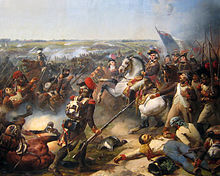From 1793 to 1815, France was engaged almost continuously (with two short breaks) in wars with Britain and a changing coalition of other major powers. The many French successes led to the spread of the French revolutionary ideals into neighboring countries, and indeed across much of Europe. However, the final defeat of Napoleon in 1814 (and 1815) brought a reaction that reversed some – but not all – of the revolutionary achievements in France and Europe. The Bourbons were restored to the throne, with the brother of executed King Louis XVI becoming King Louis XVIII.
The politics of the period inevitably drove France towards war with Austria and its allies. The King, many of the Feuillants, and the Girondins specifically wanted to wage war. The King (and many Feuillants with him) expected war would increase his personal popularity; he also foresaw an opportunity to exploit any defeat: either result would make him stronger. The Girondins wanted to export the Revolution throughout Europe and, by extension, to defend the Revolution within France. The forces opposing war were much weaker. Barnave and his supporters among the Feuillants feared a war they thought France had little chance to win and which they feared might lead to greater radicalization of the revolution. On the other end of the political spectrum Robespierre opposed a war on two grounds, fearing that it would strengthen the monarchy and military at the expense of the revolution, and that it would incur the anger of ordinary people in Austria and elsewhere. The Austrian emperorLeopold II, brother of Marie Antoinette, may have wished to avoid war, but he died on 1 March 1792.[81] France preemptively declared war on Austria (20 April 1792) and Prussia joined on the Austrian side a few weeks later. The invading Prussian army faced little resistance until checked at the Battle of Valmy (20 September 1792) and forced to withdraw.

The French Revolutionary Armydefeated the combined armies of Austrians, Dutch and British at Fleurus in June 1794.
The new-born Republic followed up on this success with a series of victories in Belgium and the Rhineland in the fall of 1792. The French armies defeated the Austrians at the Battle of Jemappes on 6 November, and had soon taken over most of the Austrian Netherlands. This brought them into conflict with Britain and the Dutch Republic, which wished to preserve the independence of the southern Netherlands from France. After the king's execution in January 1793, these powers, along with Spain and most other European states, joined the war against France. Almost immediately, French forces faced defeat on many fronts, and were driven out of their newly conquered territories in the spring of 1793. At the same time, the republican regime was forced to deal with rebellions against its authority in much of western and southern France. But the allies failed to take advantage of French disunity, and by the autumn of 1793 the republican regime had defeated most of the internal rebellions and halted the allied advance into France itself.
The stalemate was broken in the summer of 1794 with dramatic French victories. They defeated the allied army at the Battle of Fleurus, leading to a full Allied withdrawal from the Austrian Netherlands. They followed up by a campaign which swept the allies to the east bank of the Rhine and left the French, by the beginning of 1795, conquering the Dutch Republic itself. The House of Orange was expelled and replaced by the Batavian Republic, a French satellite state. These victories led to the collapse of the coalition against France. Prussia, having effectively abandoned the coalition in the fall of 1794, made peace with revolutionary France at Basel in April 1795, and soon thereafter Spain, too, made peace with France. Of the major powers, only Britain and Austria remained at war with France.
Colonial Uprisings
Although the French Revolution had a dramatic impact in numerous areas of Europe, the French colonies felt a particular influence. As the Martinicanauthor Aimé Césaire put it, "there was in each French colony a specific revolution, that occurred on the occasion of the French Revolution, in tune with it."[82] The Haitian Revolution(Saint Domingue) became a central example of slave uprisings in French colonies. Culled from Wikipedia


No comments:
Post a Comment